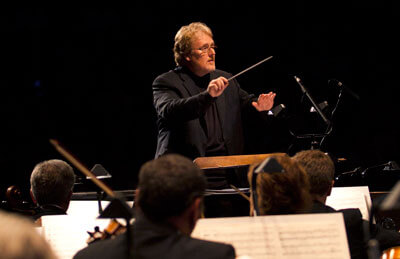RENOWNED HOLLYWOOD ORCHESTRATOR, CONDUCTOR, AND COMPOSER PETE ANTHONY IN CONVERSATION WITH LYCAEUM’S PETRU COTARCEA
Mr Anthony, you have lead and conducted many orchestras and ensembles in your long Hollywood career. What is your way of keeping people keen and motivated during your rehearsals?
The most important thing when leading people is to have them feel that they’re moving forward. It’s the case with music, and it’s the case with everything else in life.
When conducting an orchestra, the last thing you want your musicians to feel is that they are stuck doing the same passage, repeating it over and over without a clear outcome. They will then start switching off, and the rehearsal becomes sluggish and boring.
As a conductor, a concert-master, or a band leader, you have to be very clear about what you are collectively trying to achieve in your rehearsal. Then the players will become engaged and will pull together in achieving that goal.
How should a young musician go about when trying to have a high level musical career?
One key phrase: KNOW YOUR CUSTOMER!
Who is the buyer of whatever it is that you do?
Let’s say that you want to play in bands for musicals on the West End. How do you go about getting there?
First you find out who is in charge of fixing the bands or the orchestras. Then you strategize how to make yourself known to them because it is to them that you are trying to sell your craft. You need to understand what they are looking for as you make inroads to them. The fixer represents your employer, the fixer is the one who is in a position to get you paid for your skills.
You could even create a mind map of people around the person you want to reach and say to yourself: ‘Ok, if I get a good reputation with this person here, then I invite this person here to one of my gigs, and I have a lesson with this one here, word will get out that I am capable and keen, and when I finally approach the fixer – the person I was interested to impress in the first place – there is a good chance they will already know about me.’
I am telling you again: know who your customer is and what they want! This is the key to success. It sounds simple, but many bright and talented performing musicians do not grasp this.
Should music students still completing their education do this as well, or should they rely on their schools or universities to help them out?
I find that, generally speaking, educational institutions are good at providing skills, but they are less successful at providing knowledge or assistance in the workplace.
I am a member of the “Screen Scoring” faculty at the University of Southern California in Los Angeles, and more than once I have debated with fellow professors about the practical usefulness of some instruction we offer.
There is and has always been a certain tension between academia and the ‘real world’.
For example, one can go out and get a degree in, say, Latin poetry from 2nd century Sicily. That is a noble pursuit and should be encouraged for the sake of knowledge itself – I get that and respect it. For my music students, assuming they are going to pursue a music livelihood outside of academia, I cannot help but ask myself: who is realistically going to hire that student for their skills once they finish their studies? That informs my approach teaching in a “professional” program at USC.
So to answer your question, students cannot rely on their institutions to do ‘business development’ for them. In the professional world, musicians have to get out there and do it themselves.
You have worked a lot on both sides of the Atlantic. What would you say is the biggest cultural difference UK musicians should be aware of when working in the US?
In the US, people can be very direct in their interactions with each other, so British musicians should take that into account. Another important thing for musicians trying to make inroads in Hollywood is to focus on good relationships, and having respect for those relationships. For example, respect includes avoiding ‘going over someone’s head.’
I’ll explain: Say that a colleague recommends you for a violin gig to one of their employers. That goes well and you do your job, but next time you want to reach that employer, you should do it again through that same colleague. If you start enquiring for jobs directly with the employer, rather than your colleague, you have gone over their head, you are not respecting the relationship. If you become known as an aggressive, cut-throat competitor, your colleagues may disown you and hurt your prospects for further employment.
Apart from this, things are really quite similar on both sides of the ocean – in both places, there is a high expectation of technical ability and artistic sensibility, together with excellent reading proficiency and good collaboration.
Pete Anthony is one of the busiest conductors and orchestrators in the Los Angeles music industry.
In his 25-plus years in the business, Pete has worked on hundreds of feature films with Hollywood’s top composers, including James Newton Howard, Danny Elfman, John Powell, Marco Beltrami, Marc Shaiman, John Debney, Chris Bacon, Teddy Shapiro and Christopher Young.

